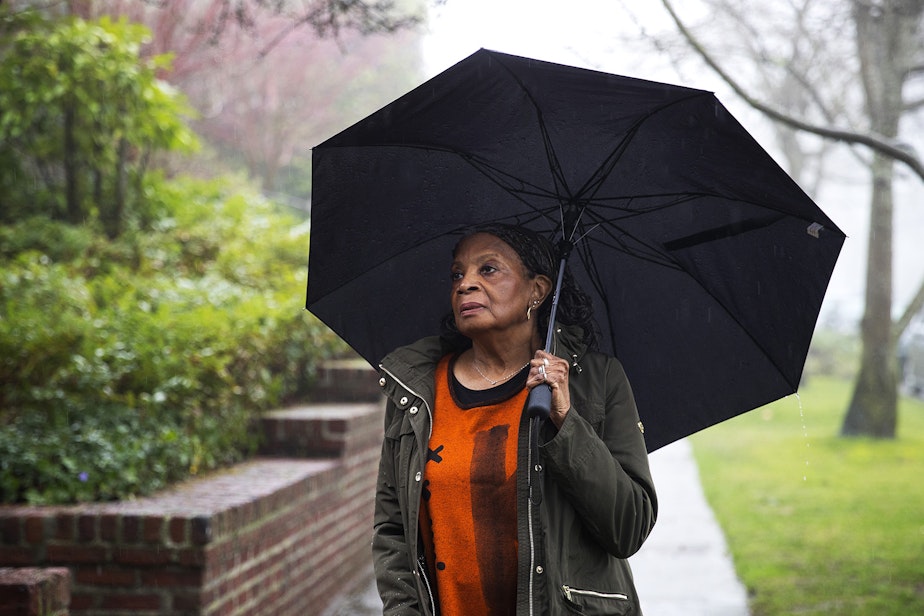Hunkered down at 85, this poet writes for love and survival

Seattle poet Colleen McElroy was diagnosed with a serious lung disorder 45 years ago.
“I suppose it’s my resilience that has me here talking now,” McElroy says. “Because I was given six months to a year to live.”
McElroy beat the odds, but at age 85, with that underlying lung condition, she would be at high risk for developing serious complications if she got coronavirus.
“For me, the risk aspects are lining up,” she says. “They have to get in line!”
'Cheering yes!' This Seattle poet believes this time may be different
She’s been hunkered down in her Queen Anne condo since mid-March, avoiding close physical contact with anyone except her live-in partner, Jim.
Coronavirus has pushed all of us to change the way we live; to develop a battery of survival strategies, whether that means tapping friends to grocery shop for us, or learning how to use digital technologies to home school our children.
Sponsored
The enforced social-distancing is difficult for everyone, but for seniors, especially those who live alone, the isolation can lead to a host of health problems, from depression to decreased brain capacity, even to early death.
Sponsored
McElroy, always a prolific writer, has leaned into her work. For many years, it’s been her way of coping with hard times. She remembers the morning of 9/11, when an artist friend of hers called to break the news of the terrorist attacks.
“She said to me, ‘Thank god we have our art!’ You can’t take that away.”
Before the pandemic hit, McElroy had been putting the finishing touches on the manuscript for her 14th poetry collection. But by mid-March, she started to write new, more timely poems. In one, titled “Sheltering,” McElroy imagines a different kind of lockdown.
“Soon after the order was given,” McElroy writes in one of these poems, “the aquarium was closed to the public. CTV cameras stood guard, recording any movement from whales to krill.”
Colleen McElroy has never shied away from difficult subjects. She began writing in the early 1970s, during the Civil Rights era. At the time, she was teaching hearing and speech sciences at Western Washington University, in Bellingham, and had been attending open mic poetry readings. She told friends she could do better than the poets she heard at the time.
Sponsored
“They told me I’d better put up or shut up,” McElroy says with a laugh.
From the outset, her work dealt openly and frankly with her experiences as a Black woman in America. McElroy wrote about rape, illegal abortion, lynching, the street life she’d watched as a young girl in racially segregated St. Louis. She and her mother lived there for a time with her grandparents, where she absorbed the family’s love of storytelling.
That passion for words—particularly the rhythms of spoken language—was McElroy’s touchstone through a life in academia, as a single mother, and now, through the pandemic.
McElroy’s dedication to the daily discipline of using her writing to capture her reflections and reactions to world events is the type of mental engagement that experts recommend for all of us, especially during these months of social isolation. Neuroscientists believe creative activities of all kinds, whether writing poetry or solving crossword puzzles, can act as preventive “medicine” for brain health.
“It boils down, a little bit, to a kind of use it or lose it phenomenon,” says Dr. Kristoffer Rhoads, a clinical neuropsychologist at the University of Washington. “Keeping your brain active and engaged in the arts provides a tremendous amount of stimulation and activity in the brain,” Rhoads says.
Sponsored
That plays a crucial role in staving off both physical and mental illnesses, according to Tatiana Sadak, a UW associate professor of nursing.
“There’s a strong body of research that shows physiological links between loneliness, depression and isolation,” Sadak explains. “Not only mental health disorders and physical illness, but mortality and death.”
Sadak works with seniors, but researchers worry the prolonged social distancing we’re all experiencing right now might have widespread, unintended health consequences. She urges all of us to reach out to people who are weathering the pandemic alone.
That’s something Colleen McElroy and her partner, Jim, do regularly.
“We have friends and family members who don’t have partners,” says McElroy. “I call them, or he calls them. We spend a lot of time reassuring them that they’re not alone.”
Sponsored
At 85, in fragile health, McElroy knows her life is finite. She and Jim love to travel; they met while both were travelling in Asia. They’ve accepted they may not be able to indulge that passion if the pandemic drags on for several more years.
But McElroy has also learned the key to life is to remain flexible, to roll with the sometimes vicious punches it can throw.
“I think the whole business of resilience is that you cannot take things personally,” she says. “Some things you simply have to say, ‘This is an obstacle I have to cope with.’”
Colleen McElroy is coping the best way she knows how, giving voice to her emotions through the poems she writes.




